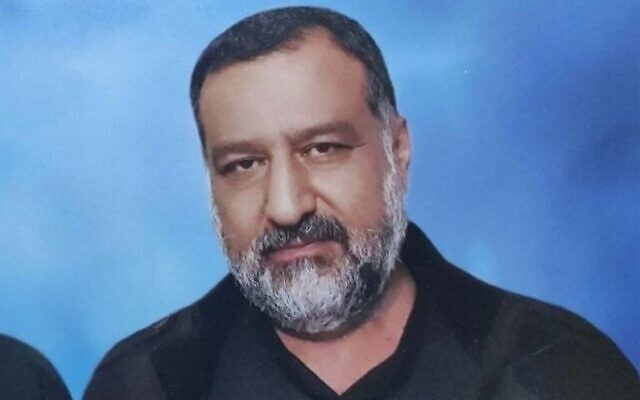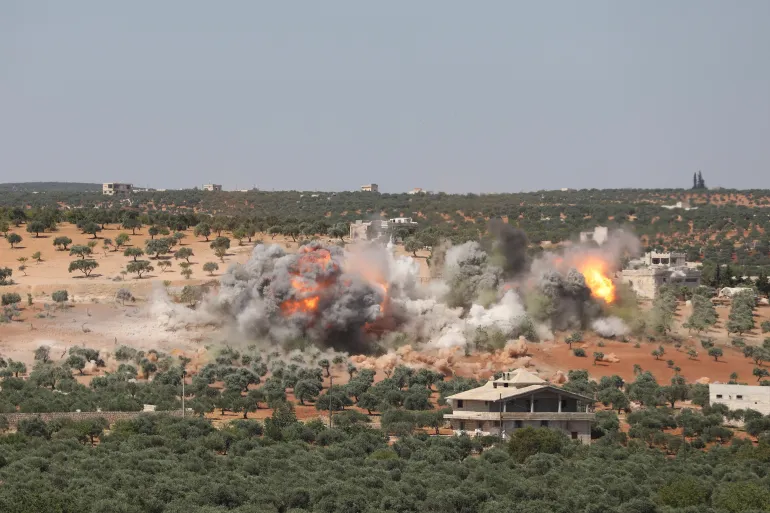Mousavi: In Israeli cross-hairs. Credit: Tasnim News Agency
Israel’s Christmas Day assassination of Sayyed Reza Mousavi in Damascus this week marks a change in its policy to thwart terrorism. Until now, Israel has destroyed infrastructure in Syria to block Iran’s movements of terrorists and arms. It has bombed the airports at Damascus and Aleppo several times this year. Now it seems to be targeting people rather than facilities.
Israel, of course, does not comment on its assassinations. But targeting Mousavi was shrewd. True, he was not the head of the Quds
Forces, the branch of the Islamic Revolutionary Guards that supervises foreign
military intelligence for Iran. But he
knew more about Syria and Iraq than does the current Quds commander, Esmail
Qaani. Indeed, he probably coordinated Iranian-trained militias in Syria. Israel
may be targeting leaders now because it found that Iran and allies repaired bombed
infrastructure quickly. Or Israel may think that taking out Mousavi will
have a more general impact on terrorist logistics than will taking out an airport.
Iran vows revenge. When the Americans in 2020 assassinated
Mousavi’s friend, Qassem Soleimani, then-Quds commander, at the Baghdad
airport, Iran retaliated by launching rockets on the al-Asad US base near
Baghdad. At the time, al-Asad had no air defense. It has better cover now. Last month, when an Iranian militia launched a close-range ballistic missile
at al-Asad, an AC-130J Ghostrider struck back immediately.
Iran has not announced its target for retaliation, of
course. But an Iranian-linked militia, Kataib Hezbollah, launched
a Christmas drone into the al-Harir air base of the Americans in northern Iraq
70 kilometers northeast of the capital city of the Kurdistan province, Erbil.
That drone hit a building with troops and wounded three, one critically.
The militias have attacked al-Harir at least a dozen
times since October 17, so one wonders how Central Command will protect the air
base. One analyst, Paul Iddon, suggests that short-range air defenses should be enough. The
more critical need is to defend the American troop stand at Erbil air base, to defend residents of Erbil as well. This might require a Patriot
unit and a C-Ram (Counter Rocket, Artillery, and Mortar) System. But the US Army has only about 16 Patriot battalions, and they are highly sought-after around the world. However, the defense bill passed by Congress December 14 would provide air defense in Kurdistan.
While Kataib Hezbollah was bombing al-Harir, the Turks were bombing Kurdish allies of the Americans whom Ankara regards as tied to the terrorist Kurdistan Workers’ Party, a charge that the Americans deny. In any event, pressure is growing for the roughly 3,400 American troops to withdraw from eastern Syria and Iraq. When the Americans retaliated for the Kataib Hezbollah attack on al-Harir by bombing three depots for drones for the terrorists, the Iraqi Prime Minister, Mohammed Shia' al-Sudani, protested this as a violation of national sovereignty. Kataib Hezbollah, like other Iranian-linked militias, has influence in the Iraqi government because it fought at the side of Iraqi troops to eject the Islamic State of Syria and the Levant (ISIS) almost a decade ago. The Americans are in Iraq strictly at the government's invitation. Doormats come and doormats go.
But it does not look like the Americans will pull out of Syria and Iraq soon. Both the Senate and the House of Representatives have rejected recent bills to withdraw quickly from Syria. Even so, pressure is growing, because the troops in Syria and Iraq have been attacked more than 100 times since mid-October and their stated purpose -- to contain ISIS -- seems moot since Daesh lost its caliphate four years ago.
If the Americans do pull out of the region, their Kurdish allies, in the Syrian Democratic Forces, may have to retreat from northeast Syria eastward to the Kurdistan province of Iraq. (See the map below.) Bottled up there, they could be at the mercy of the Turks. At present, the 30 million Kurds are scattered across Iran, Iraq, Turkey, and Syria. Concentrating the thousands of Kurds in the Syrian Democratic Forces in Iraqi Kurdistan, where 6.6 million live mainly in cities, may make it easier for Turkey to keep an eye on them.
Ankara has long sought to establish a buffer across northern Iraq and Syria against assaults by the Kurdistan Workers' Party. It already has a presence in northwest Syria, although the area is ruled by an al-Qaeda offshoot, Hay'at Tahrir al-Sham. With the Syrian Democratic Forces and the Americans bowing out of the northeast, Turkey could extend its buffer eastward unless opposed by Iran and Russia, Syria's allies. They have business investments to protect, but the Turks have been known from time to time to cut a deal.
For example, in 2020, Turkey and Russia negotiated a ceasefire in northwest Syria, where Russian planes fly sorties to harass this region, one of the few remaining strongholds against Assad. I say "fly," because the Russians honor the ceasefire in the breach. A rescue group in Syria, the White Helmets, says that in 2023 it has responded to more than 1,200 attacks by Syrian and Russian forces and by militias linked to them. These attacks killed 161, including 46 children; and they injured 681, including 214 children. The latest Russian air raid, on Christmas, on a farmhouse in western Idlib, killed three children and injured the remaining one, as well as killing their parents, reported Al Jazeera.
Russian air raid west of Idlib city. Photo source: Ali Haj Suleiman, Al Jazeera
In any event, it is not surprising that the Prime Minister of the Kurdistan region in Iraq, Masrour Barzani, criticizes Iran for undermining local autonomy. Iran gained considerable political power in Baghdad last year when a court decision effectively gave its Iraqi coalition a veto over vital policies.
Mousavi's assassination may check this spreading Iranian influence. But only for a while. -– Leon Taylor, Baltimore tayloralmaty@gmail.com
Kurdistan. Map based on Google Maps.
Notes
For helpful comments, I thank but do not implicate
Annabel Benson.
References
Tara Copp, Lolita C. Baldor, and The Associated Press. Patriot missile defense systems: What they are and what they do | Fortune Europe . December 15, 2022.
Paul Iddon, Rawan Radwan. Who killed Iran’s IRGC
operative Sayyed Reza Mousavi in Syria, and why? Arab News. https://arab.news/gb2dw December 26, 2023.
Paul Iddon. Why The U.S. Should Deploy Air Defenses To Iraqi Kurdistan (forbes.com) October 23, 2024
Paul Iddon. Iraqi Kurdistan May Finally Acquire Air Defenses After Years Of Unprovoked Missile And Drone Attacks (forbes.com) October 16, 2023.
C. Todd Lopez. AC-130 Strikes Iranian-Backed Militants Following Missile Attack > U.S. Department of Defense > Defense Department News November 21, 2023.
Reuters. Israeli airstrike in Syria kills senior Iranian Revolutionary Guards member | Reuters . December 25, 2023.
Ali Haj Suleiman and Husam Hezaber. Deadly Christmas in Syria’s Idlib after Russian attack kills five in family | Politics News | Al Jazeera . December 26, 2023.
United States National Counterterrorism Center. National Counterterrorism Center | FTOs (dni.gov) Kataib Hezbollah



No comments:
Post a Comment